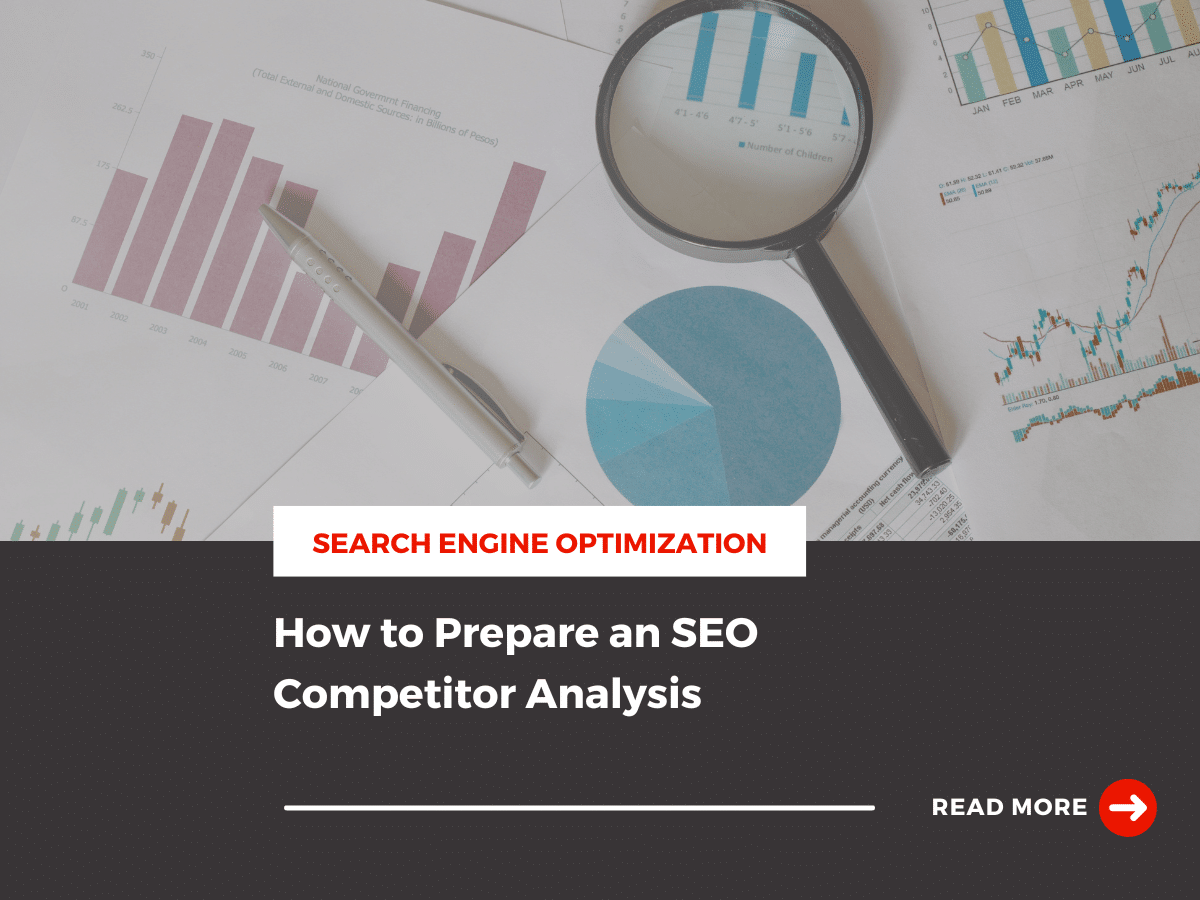Did you know that over 61% of marketers believe SEO is the most effective way to grow your online presence? Search engine optimization is an invaluable tool that can help your business gain authentic brand recognition with your target audience. With high-quality content, link building, and optimization, your business can create a next-level strategy to rank on the search engine result page and gain authentic recognition from your target audience.
However, if you aren’t including an online competitor analysis in your plan, you won’t have the data you need to make informed, strategic decisions.
We’re here to walk you through everything you need to know to conduct a competitive SEO analysis.
Let’s take a closer look:
What is an SEO Competitor Analysis?
An SEO competitor analysis is a tool businesses use to rethink their current strategy and find new opportunities. With a competitor analysis, you can gain a better understanding of what your competitors are doing and find new ways to utilize their tactics for your own business.
Getting Started
Before you take a deep dive into your competitor’s strategy, it’s time to take a step back and look at your own and consider what you’re hoping to get from the SEO competitor research.
Identify Your Competitors
To get started, you need to identify your competitors. You’ll want to focus on competitors that are comparable to your business and would use similar keywords and market to a similar audience.
For example, if you’re looking to rank for words like “men’s dress socks,” you may notice that companies like Amazon outrank your website. While they probably sell men’s dress socks, they aren’t considered a true competitor that you’d want to include in your analysis.
To find true competitors, you’ll want to research 5-10 keywords and look at which companies appear on the SERPS for all of the keywords.
There are free SEO competitor analysis tools, like Moz, to help you determine your competitors. This free tool will help you conduct competitor research and give you the tools you need to identify your competitors and give you the tools you need to succeed.
Set Your Goals
Before conducting SEO competitor tracking, you’ll want to consider your goals. Are you looking to refine your strategy to see more conversions, grow your business, or position yourself as an industry expert? Do you want to increase website traffic, get more backlinks, or decrease your bounce rate? Once you know your own goals, you can use the data and insights you gather to improve.
The Different Types of SEO Competitive Research
Before you dive in, it’s important to note that there are a few different ways to pull and analyze data. You may find that all of these reports are beneficial to your competitor research, or only just a few.
Here are the four we recommend to help you get started:
1. Backlink Analysis
Content isn’t the only factor you should keep your eye on. While high-quality content can help you rank, without backlinks, you’ll never have a successful SEO strategy. If you aren’t familiar with backlinks, backlinks are links to your website that are featured on other sites. These links build your credibility and help you position your business as an industry expert.
Google uses these backlinks to determine the trustworthiness of your site. If you don’t have many backlinks, it suggests you aren’t a reliable source of information.
If your competitors have more backlinks than your site, it could be what is helping them outrank you. To perform backlink analysis, you’ll want to take a deep dive into your competitor’s current backlinks. This will help you revise your current strategy and give you the feedback you need to create to fill in the gaps.
2. Technical Analysis
Technical analysis takes a closer look at your website vs. your competitor’s technical optimizations. This includes internal linking, website structure, SSL certification, page speed, and mobile-friendliness. If your competitor struggles with one of these essential components, you may find that there are opportunities for you to grow your online presence and outrank them. With this analysis, you can also find new ways to improve your site.
3. Top Content Analysis
The content your competitors produce is what sets them apart from you. You’ll want to look at the blogs, social posts, and content they create to connect with their audience. These are the tools they are using to foster connections and build credibility. As their competitor, you can use this content to fine-tune your content strategy and build a next-level content strategy.
4. Keyword Analysis
A keyword analysis is often referred to as a keyword gap analysis. It’s a tool that helps you understand the keywords your competitor uses and will help you refine your content strategy and find new opportunities. With this analysis, you can find new high-volume keywords that relate to your business you can capitalize on. You can also use these words to refresh your old content.
A great tool to help you take a deeper dive into your competitor’s keyword usage is SEMrush. SEMrush is a competitor analysis tool frequently used for keyword research and to analyze internet rankings, including search volume and cost per click.
Tips For Adjusting Your Strategy
Once you have your competitor’s insights and analysis, it’s time to sit down and take a closer look at what you’re doing currently and what you can be doing better. The best SEO strategy is constantly evolving. You’ll want to use the insights you gain to improve your current strategy, find new opportunities, and connect with your target audience.
Build a New SEO Strategy
After you’ve conducted an SEO competitor analysis, it’s time to rethink your current strategy. What’s working and what’s not working? What keywords are your competitors ranking? Which ones are they not? Are you prioritizing backlinks as much as your competitor? You should be able to answer all of these questions with your SEO competitor research. Once you have the data and insights, you can utilize your competitors’ success to find new ways to rank and get recognized by your target audience.
Rethink Your Keywords
When it comes to SEO competitive research, keywords are a vital tool. If you aren’t currently utilizing the right keywords in your content, it may be holding you back from seeing success. Instead of always shooting for the keywords with the highest search volume and competition, consider long-tail keywords, short-tail keywords, and keyword intent. There are four known types of search intent.
Here’s a breakdown:
- Navigational: These are keywords for users that want to find a specific page, such as a homepage or login page.
- Informational: Informational keywords help users learn more about something they are interested in. They are typically associated with big ideas and questions.
- Commercial: Words used to help users conduct research before making a purchase decision. These words are often paired with words like best or top-rated.
- Transactional: Keywords that help individuals complete a specific action.
With this insight, you can diversify your keywords and give you the competitive edge to reach your audience.
Analyze Data and Track Your Success
A great strategy is always growing. Every quarter, you’ll want to analyze your success and find new opportunities. With this data, you can continue to finetune your strategy and get your content to rank higher on the SERPs.
Once you have a plan set in place, you’ll want to track and monitor the performance of your primary keywords and make adjustments to your strategy when necessary. When you analyze data and look at your results, it helps to have KPIs set in place for every quarter and month. KPIs are great tools that will help you define your path toward success and provide you with a road map to help you get closer to success.
Work With an SEO Agency
The world of SEO is constantly changing. If you want to stay two steps ahead of your competition: you’ll need data, insights, and a fresh perspective. With an SEO expert, like Kanbar Digital, you can find new ways to outrank your competitors and maintain your competitive edge. We can help you prepare an SEO competitive analysis and give you the tools you need to create content and enhance your online presence.



